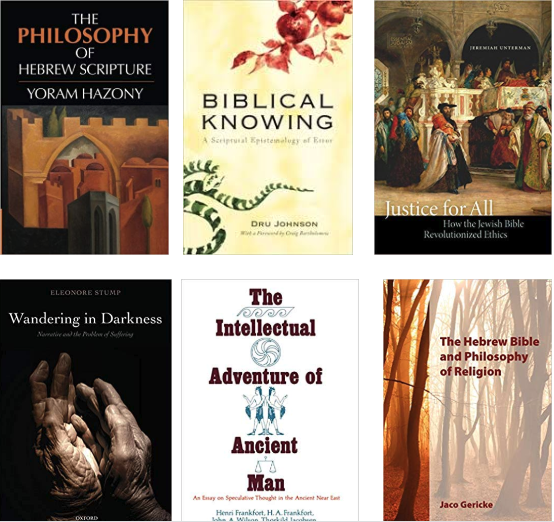What Is Hebraic Thought?
What is Hebraic thought?
Why does Hebraic thought matter?
What does the study of Hebraic thought look like?
What is Hebraic thought?
“Hebraic thought is more than just religion—it’s a fully-formed cultural tradition. It includes that rich collection of ideas, concepts, stories, and values that emerge from the world of ancient Israel.”
Robert Nicholson
The Hebrew Bible contains a rich tapestry of ideas that the biblical authors worked out over centuries. In addition to communicating God’s instruction to His people, these authors developed rigorous, systematic thoughts about the nature of reality and knowledge. These thoughts aren’t just musings; the authors advocate a way of understanding reality. Their ideas, together with the way they arrived at those ideas, constitute “Hebraic thought.”
In scholarship, this has traditionally been referred to as “biblical theology,” but it’s Hebraic thought because it comes to us in the ancient language of Hebrew and for Hebrew people—later adapted into other cultures and languages.
Watch this video that explains how Hebraic thought has shaped our culture.
Much as we might think of Greek thought, Mesopotamian thought, or Chinese thought, Hebraic thought is uniquely found in what Christians call the Old and New Testaments. This kind of abstract thought and practice was noticeably absent in the ancient Near East. That is why it’s the Hebraic thought-world that Henri Frankfort, the renowned ancient Near Eastern scholar, referred to as “without peer in the power and scope of their critical intellectualism.”
Why does Hebraic thought matter?
“‘Hebraic thought’ refers to the reasoning and philosophy developed within the Hebrew Bible, continued into the New Testament, and not found elsewhere in the ancient Near East.”
Dru Johnson
The Church has historically studied Scripture to see what and how ancient Israel thought about reality. Yet, over the past two centuries, pastors, scholars, and the rest of us have become tone-deaf to the theology of the biblical authors in their ancient context. What’s more, Christian theology itself has often worked independently of the biblical thought-world, built upon the scaffolding of modern philosophical projects or even ancient Greek ones.
We experience the consequences of this in our churches. Our theology thins when we treat biblical stories as if they were Aesop’s Fables, stand-alone stories with a single moral to be learned, unaware of the sophisticated system of thought tying them all together. Believing that Scripture lacks relevance and sophistication, we turn elsewhere in our culture’s philosophical traditions for guidance. Being shaped by these other traditions, we deepen our dependence on cultural philosophies of personal autonomy and fairness while growing numb to Scripture’s voice on matters such as justice, technology, and politics.
Through an informed, biblically literate study, students of Hebraic thought can come to see the Bible as the robust, sophisticated source of instruction and the authoritative voice that it is, informing the way we think about politics, ethics, epistemology, science, church, and more.
Furthermore, understanding Hebraic thought is vital for understanding the intellectual heritage of the Western world, including the church in the West. Every culture has a tradition out of which it was born; the West is no exception. Westerners have traditionally conceptualized themselves as descendants of the Greek and Roman thought that developed in Europe. However, the Hebraic tradition also greatly influenced the development of Western thought in Europe and was rigorously engaged by the constructors of British tort law and by the American founders.
Fundamental presuppositions of Western thought—from the existence of the weekend to the conviction that all humans are created equal—hail from the ancient Israelites, not Greece. To understand the world we now live in, we must understand Hebraic thought and its influence on Western development.
The boundary between the ancient world and the modern is to be traced, not in the Aegean or the middle Mediterranean, but in the pages of the Old Testament, where we find revealed Israel’s attainments in the realms of thought, her facility in literary expression, her profound religious insights, and her standards of individual and social ethics.1Italics mine. William A. Irwin, The Intellectual Adventure of Ancient Man, 224.
The Hebrew Bible contains a sophisticated and heretofore largely overlooked intellectual tradition that must be taken seriously in the history of Western thought, and can be appreciated by devout Christians and Jews, educated skeptics, scholars, and laypeople alike.
What does the study of Hebraic thought look like?
People have always studied the intellectual world of the Bible, thinking about how concepts are developed and connected across the biblical texts. This is done by looking at how Scripture deals consistently, across the canon, with central human concerns such as ethics, politics, rationality, science, anthropology, and more.
One stellar example of this is The Bible Project, a scholar and artist team who use animation to explore key ideas across the Scriptures.

Scholars have also had an interest in the thought-world of the Bible since antiquity. Recently, there has been a renaissance in thinking about the Scriptures philosophically. A few key examples would be:

See the “For Scholars” page for more on this growing field of study.
The various studies, books, and videos collected here reveal that more than one method for understanding Hebraic philosophy exists. Our goal is to encourage a plurality of methods and foci that will collectively enrich our understanding of the bounty of wisdom and thinking displayed across the Bible.
